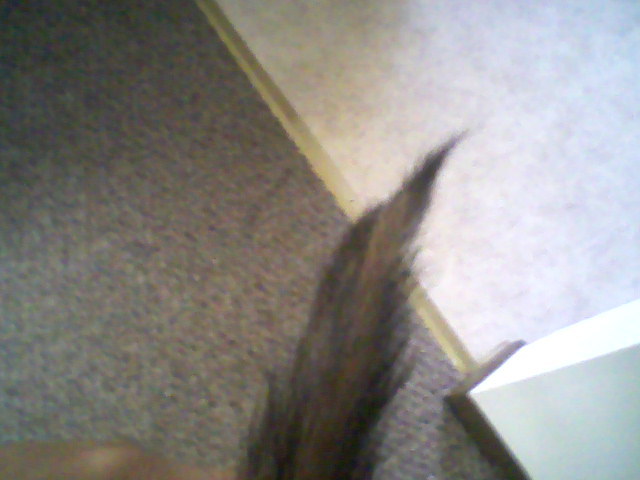QuestionHi there. Our family is going to be the proud parents to a new ferret. I was just wondering what are some pointers you can give for some basic concerns, like keeping our baby smelling good and his cage, what toys are best to entertain him?, can I give him cat treats( as where I live do not sell ferret treats) can i use any other shampoo (like cat, or even baby) What is the proper litter to use for him? what would you recomend for each question? thanks for your time
AnswerHi Christina:
Congratulations on making the decision, but especially for looking into what is required of you and what your little friend will need BEFORE you bring him home. Ferrets are SO MUCH FUN!! If you have ever spent any time around one, you already know how endearing they are; few know how intelligent and social ferrets are or more people would have them! The down side of owning ferrets is that they require DAILY interraction with their people for a minimum of 2-3 hours. They live to be usually an average of 6 to 8 years of age, so it's a good idea to look down the road about six or eight years and imagine where your life may have taken you by then. If you know you will be having a big lifestyle change where a ferret wouldn't fit in within that time, perhaps a different pet would be a better choice....or maybe still a ferret, but get one from a shelter that is 4 or 5 years old (and they are cuddly lap ferrets by then!). Ferrets bond very very closely with their people and often die if they are re-homed. If course, things happen in life that we cannot foresee, but it is best to at least take into consideration those things that we do know. A ferret is truly a commitment; somewhat like a child because it requires a daily commitment. A ferret cannot be put in a cage like a hamster - he/she MUST have social interraction or they can develop emotional problems and even become destructive or angry.
There is SO much to do once you bring a new ferret home, it makes life so much easier if you have already ferretproofed (made safe for your ferret) at least one room where the ferret will be allowed to play. Ferretproofing is NUMBER ONE in importance - if you miss just one rubberband, one styrofoam packing peanut, one baby bottle nipple (and lots of other items too!) your ferret will most likely find it, chew on it, swallow it and one of two things will probably happen: 1 - you will recognize the symptoms of intestinal blockage in time and you will *only* have to pay for surgery to have the item removed from the ferret's tummy; OR 2 - you will not recognize the symptoms and your ferret will die from an obstructed bowel. So, you can see how important it is not only to ferretproof thoroughly, but to learn to recognize symptoms of intestinal blockage, which can be common if the ferret does not receive consistent and adequate treatment for even the fur the ferret swallows when he/she grooms daily. Here are a few websites to help you ferretproof - to give you a good start:
* http://www.ferretcentral.org/faq/part2.html#ferretproofing
* http://groups.msn.com/Ferret/yourwebpage10.msnw
* http://groups.msn.com/Ferret/ferretproofing2.msnw
Another really important thing anyone considering purchasing a ferret needs to know is that whatever price you pay for your ferret is probably the smallest "bill" you will ever pay on his/her behalf. After that comes the regular vet visits with vaccinations (distemper and rabies), a high protein ferret-specific diet. When folks ask if they can feed cat food instead of ferret food, there are just a very few cat foods that really do meet the high quality protein needs of a ferret and if the purpose of using a cat food instead of ferret food was to save money, usually the cat food ends up costing at least as much as the proper ferret food would have cost anyway. The good news nowadays is that we do have the internet and even though I live in a town large enough to have a pet store, I buy my ferret food online because it is fresher (not that many ferret owners locally) and they have so rmany other items available too. My favorite ferret food/treat/toy places online are http://www.drsfostersmith.com and
http://www.ferretdepot.com . Your best guide for which food to buy for your ferret is to buy the very best quality you can afford. If you feed cheap food, your ferret's health will suffer and you will end up with vet bills, so I have always thought it is just easier to feed higher quality food and have healthier ferrets to start with...they get enough sicknesses on their own even when they do have excellent nutrition. Here's a chart that's great for choosing a food:
http://www.mdferretpaws.org/care/food_treats.html
Not all foods are available in all areas, but the internet makes them all available to anyone if they really want it. Ferrets are "obligate carnivores" which means they require a high quality protein (from meat sources) diet. They do not have a caecum - the part of the stomach that digests plant material, so they should not have ANY fruits or vegetables of any kind. Just recently it has been discovered that one of the diseases that has taken many ferret lives, Insulinoma (cancer of the pancreas), ONLY happens in ferrets who have been fed sugar in some form - either in their treats, or even just an occasional sweet treat is enough to trigger the insulinoma...so NO SUGARS - read all labels and anything ending in "ose" is a sugar, i.e. "lactose", "fructose", "maltose", etc...are all no-no's. Great treats for ferrets are Ferretone, or Linatone, a liquid vitamin oil (mix 1/2 and 1/2 with virgin olive oil so the ferret doesn't get too many vitamins the body can't excrete, and he/she can have up to a teaspoon a week). I mix mine in a little dropper bottle that I keep handy to treat the ferrets with and keep the big bottle in the fridge to keep it from going rancid. They like it just as well and the olive oil is good for them too.
As you can see, there is sooooo much to tell you about ferrets. I cannot even begin to tell you even the smallest bit here. I do, however, recommend you READ as much as you can get your hands on BEFORE YOU BRING THE FERRET HOME. There is a book called FERRETS FOR DUMMIES by Kim Schilling and there are also great online websites you can read for free and get the same information. Those websites should be in your 'Favorites' list so you can find various topics later anyway, so I will list the websites here for you to save you some time:
* www.thechipster.com/fert-man.html (THIS ONE IS GREAT!)
* http://en.wikipedia.org/wiki/Ferret#See_also
* http://www.ferretcentral.org (scroll down to topic necessary)
http://www.craftycreatures.com/forferretsonly/ferret_school/ferretschool_aboutfe...
* http://www.craftycreatures.com/forferretsonly/ask_angela/index.html
There are many ferret groups online too! You can learn a LOT there - that is one place you can learn from other's experiences instead of having to learn everything the hard way. I am so very grateful for those who guided me when I had my first ferret and didn't have a clue what to do for him! You are always welcome to come here to ask a specific question too - it's just too 'general' for me to tell you all about ferrets in this space - people have written books about that - lots of them! Some things you won't have to worry about until they happen, but other things, like ferretproofing, you MUST do to keep your ferret safe. Be SURE you get a good "exotics" vet - not just a dog and cat vet. Good to locate one before getting the ferret if possible. Here are some lists of ferret vets other ferret owners have submitted, so you know they are experienced with ferrets. "Regular" vets have less than SIX HOURS of instruction devoted to "exotics" (includes ferrets, chinchillas, birds, turtles, snakes, etc) in their whole curriculum UNLESS THEY SPECIALIZE in exotics. Yes, it costs a little more, but believe me, it's worth that extra few dollars! Here are some ferret vet lists for you:
VETS CANADA:
* http://www.ferretrescue.ca/start.php
* http://tinylink.com/?TlVyYKa6e0
* http://www.ferrets.org/Veterinarian_Listings.htm (British Columbia)
* http://www.ferretcentral.org/for-others/db-vets.html
* http://pets.groups.yahoo.com/group/sask_ferrets/
VETS USA:
* http://www.quincyweb.net/quincy/vet.html
* http://ferrethealth.org/vets/
* http://www.ferret-universe.com/vets/vetlist.asp
* http://www.ferretsanctuary.com/vets.shtml
* http://www.ferretcentral.org/for-others/db-vets.html
* http://ferrethealth.org/vets/
Be sure to do your homework BEFORE you bring that little one home - one of the first things you will have to decide is a cage. My recommendation is the largest, sturdiest one you can afford; think of litterbox placement and since the litterbox is usually on the bottom level and food and water on the top level (so litter doesn't drop down into the food/water), be SURE you can easily get into that door with a big serving spoon (that's what I use) to scoop that litterbox because you will do it twice a day for years and years to come. Large, easy access doors on each level. Here are my personal favorite choices for cages:
CAGE RECOMMENDATIONS: http://www.martinscages.com/products/cages/ferret/
* FERRET VILLA .........cost: $84
* NEW ENGLANDER.......cost: $173
* TOWNHOUSE F-450.....cost: $190
MORE CAGES w/full floors:
* http://www.nextag.com/ferret-cages/search-html
MIDWEST PLAYPEN FOR FERRETS:
* http://www.mightypets.com/product.asp?3=1995
Hopefully that's at least a little bit of pointing in the right direction. You can read past questions and answers on this website and get lots of information too - some questions you will see asked over and over and over - that means those are things that commonly happen and it's a good idea if you know what to do when it happens at your house :-)
I wish you the best of luck and years and years of fun, laughter and happiness with your new little one. I would encourage you to consider getting a ferret from a shelter instead of a kit (baby ferret). One reason is that kits can be very difficult; older, calmer ferrets are the best "first ferret". Your shelter mom can lead you to whatever personality type you're looking for instead of just tossing the dice....want cuddly? you want an older ferret! Want a ferret but maybe not for 8 years? A shelter ferret that's 4 or 5 years old might be perfect for you! So, here are the shelter lists for you:
SHELTERS - CANADA, GERMANY, NEW ZEALAND
* http://www.ferretfacts.com/ferret-shelter-directory-international-ferret-shelter...
SHELTERS/RESCUES - UK (ENGLAND)
* http://www.everythingferret.com/ferret_shelters.htm
* http://homepage.ntlworld.com/ferreter/ferretrescues.htm
* http://www.ferretfacts.com/ferret-shelter-directory-international-ferret-shelter...
SHELTERS/RESCUES - U.S.
* http://www.ferret.org/links/shelters.shtm
* http://www.everythingferret.com/ferret_shelters.htm
* http://groups.msn.com/Ferret/yourwebpage5.msnw
* http://www.ferretcentral.org/for-others/db-products.html
* http://www.ferretfacts.com/ferret-shelter-directory-us-ferret-shelters.html
An added benefit is that the shelter mom will be happy to help answer questions and get you started - may even have a cage you can start with! Will definitely be able to guide you to the best and cheapest ferret vet in your area. It's ALWAYS a good idea to get to know any ferret shelter moms in your area. They are truly angels on earth. The very best thing about shelter ferrets is that they KNOW they have been adopted and they appreciate their new homes. They are notoriously well-behaved, try so hard to please, and since they aren't young and so bouncy, they will often lay in your arms and sleep while you're watching TV at night - and THAT's heaven on earth!
Sincerely,
Jacquie Rodgers

 balding tail
QuestionQUESTION: The ferret I am talking about is one
balding tail
QuestionQUESTION: The ferret I am talking about is one
 Skin Condition
Question
Chewie
I own 5 ferrets, ranging from 3 to 5. I
Skin Condition
Question
Chewie
I own 5 ferrets, ranging from 3 to 5. I
 biting
Question
rascal
hey, i have just bought my first ever f
biting
Question
rascal
hey, i have just bought my first ever f
 My 7 yr old ferret is obsessively chewing her toys
Question
Cecilia and her babies
Hi,
My ferret Ce
My 7 yr old ferret is obsessively chewing her toys
Question
Cecilia and her babies
Hi,
My ferret Ce
 ferret love
Question
snert
hi my name is john from england i had to
ferret love
Question
snert
hi my name is john from england i had to